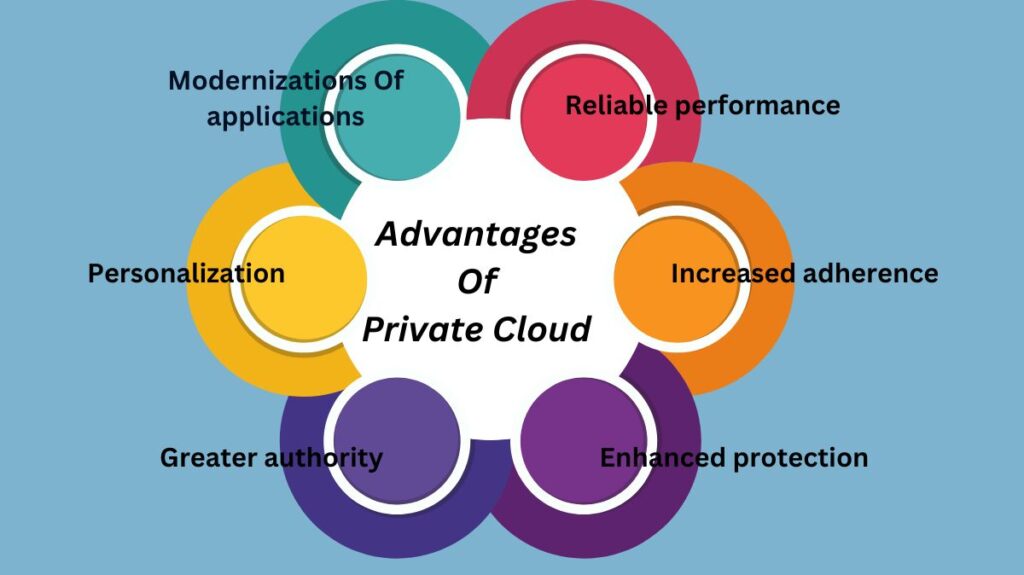Advantages And Disadvantages Of Private Cloud
Advantages Of Private Cloud Computing

Personalization
You may provision and modify infrastructure in a private cloud according to your own technological needs and commercial objectives.
Greater authority
Private cloud platforms provide you more visibility and control over your data and infrastructure since they are housed in private settings, either on-site or in a third-party data centre.
Enhanced protection
Instead of using the public internet, private clouds function in secluded, specialized settings that restrict access to a single organisation over private and secure networks.
Increased adherence
A private cloud can be freely deployed to satisfy retention or access-control requirements. You have control over where computing occurs and where your data is kept to private cloud infrastructure.
Reliable performance
Because your gear isn’t shared with other businesses, performance is more predictable in private cloud settings.
Modernizations of applications
To update old apps, many businesses choose to employ private cloud environments. Private clouds are a simpler way to move workloads to the cloud since they can be tailored to fit specific applications.
Disadvantages Of A Private Cloud

- The primary disadvantages of private clouds for businesses is their increased expense, particularly if new hardware needs to be bought and installed.
- Additionally, you might need to engage or allot personnel for cloud management and upkeep, as well as pay for operating systems and software licensing.
- Furthermore, private cloud solutions sometimes provide less scalability and flexibility.
- The gear and software you have already bought and configured determine the available capacity and capabilities;
- Thus, if you wish to grow or add new features, you will need to buy more.
Types Of Private Cloud
On-premises, virtual, hosted, and managed private clouds are the main types. Depending on who oversees the environment and where it is hosted, these private cloud environment types vary from one another. Depending on the requirements of your company, each form of private cloud offers a range of features and advantages.
Let’s examine each kind of private cloud in more detail:
On-Premise Private Cloud
Your IT staff is in charge of on-premises private clouds, which are housed in your data centre. High degrees of control over data privacy, security, and customization are possible with an on-site private cloud, but its capacity is constrained by your infrastructure.
Managed Private Cloud
Using shared public cloud resources, a virtual private cloud (VPC) provides private resources and a separate environment. You may create and manage a unique virtual network that functions similarly to a private cloud setting using a VPC service. This enables you to use the pooled IT infrastructure of a public cloud provider while managing workloads independently of other organizations.
Hosted Private Cloud
On the cloud servers of a third-party vendor, hosted private clouds, also known as private cloud hosting, are operated off-site. Private cloud servers are utilized by a single organisation, as opposed to a VPC, which requires sharing with other clients. More resources, popular scaling choices, an intuitive dashboard, and a support staff are all provided by hosted private cloud services. Furthermore, cloud resources are owned and managed by the service provider, who also handles security, maintenance, and updates.
Private cloud management
Managed private clouds can be found on-site at your company, where infrastructure is not shared, but they are usually found in hosted single-tenant cloud environments. When it comes to fully managed private clouds, the software, network, and operations of the private cloud are all under the control of a third-party provider. Other services like identity management, storage, backups, and disaster recovery may also be provided by providers.
Virtual Private Cloud
A public cloud provider’s service that builds a private cloud-like environment on public cloud infrastructure is called a virtual private cloud (VPC). By simulating the private cloud’s improved security in a multi-tenant setting, a virtual private cloud (VPC) allows a client to construct and manage a logically isolated area in the public cloud.
While keeping much of the protection and control of a private cloud, VPC clients may take advantage of the public cloud’s resource availability, scalability, flexibility, and cost-effectiveness. Generally speaking, a virtual private cloud (VPC) is easier to administer and less costly to construct than an on-premises private cloud.
Private Cloud Storage
Private cloud storage, often referred to as internal cloud storage, involves using cloud service delivery methods to provide storage to a business. Although access is provided as a service to business units and perhaps partner organizations, data is kept on a dedicated infrastructure within the data centre. This preserves the single-tenant design while enabling the business to benefit from some of the features of cloud computing, such flexibility and quick provisioning.
Public Cloud Vs Private Cloud Vs Hybrid Cloud
| Feature | Private Cloud | Public Cloud | Hybrid Cloud |
|---|---|---|---|
| Ownership | Organization | Cloud Service Provider (CSP) | Combination of both |
| Environment | Single-tenant | Multi-tenant | Combination of single-tenant and multi-tenant |
| Control | High | Low to Medium | Medium |
| Security | High | Medium to High | Medium to High |
| Flexibility | Low to Medium | High | High |
| Scalability | Medium | High | High |
| Cost | High upfront, lower operational | Lower upfront, higher operational | Varies |
| Maintenance | Organization | CSP | Combination of both |
| Best Suited For | Highly sensitive data, strict compliance, legacy applications | Cost-effective, scalable workloads, new applications | Combination of both, balancing control and flexibility |
